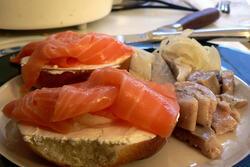It's Ok to Gain Weight during the Pandemic
“Please raise your hands if you would trade five years of your life for the so-called perfect body.” This question, posed by a speaker at a feminism lecture in Phoebe Waller-Bridge’s hit show, Fleabag, showcases the immense societal pressure for women to conform to traditional beauty standards and work to achieve a “perfect” body. This goal is unattainable, by the way. The fact that Fleabag and her sister both raise their hands makes the point that there are in fact women who would shave years off their lives if it meant having the “perfect” body, whatever that means.
It is within this context that I turn to a phenomenon I’ve noticed during the COVID-19 pandemic: an absolute barrage of fatphobia and fat-shaming related to quarantining. Every single day my social media is littered with posts from people, mostly women, who are either bemoaning the fact that they’ve gained weight, or expressing fear that they may gain weight. Jokes about the “COVID 19” (a play off of the “freshman 15”), cartoons like this one, and nonstop ads for weight-loss products and workouts to help combat “quarantine body,” all lead one to believe that fat, not coronavirus, is the enemy.
Look, I understand where this all comes from. In our patriarchal society, a woman’s worth is directly tied to her appearance. It’s not to say that there aren’t also men who are fearful of gaining weight, but the stakes are much higher for women because our value hinges on what we look like. That being said, when we place so much weight (pun intended) on our own appearances, we perpetuate this harmful idea.
As someone who has struggled with disordered eating for most of my life, I have sympathy for those concerned about weight gain right now, but I also understand how harmful and triggering the expression of these fears can be. In a recent article in Psychology Today, Dr. Renee Engeln states, “When you make comments suggesting that gaining weight is one of the worst things that could happen to you during this outbreak, you’re sending a clear message to everyone whose body is bigger than yours—and it’s not a nice message.” She goes on to say “Those living with bulimia or binge eating disorder may be having a very difficult time managing their symptoms right now. Memes and posts that treat bingeing like a joke do a disservice to those who might be struggling to manage serious eating disordered behavior.” In other words, not only is this type of content unkind to yourself, it’s unkind, and often harmful, to others.
I’d like to turn to another pop culture reference that can help us unpack this issue. In one of Midge Maisel’s stand-up routines on the tv show The Marvelous Mrs. Maisel, she says: “Jewish parents. Yell at your sons for not eating enough, yell at your daughters for eating too much.” Now, while I’m guessing this sentiment will ring true for many of my fellow Jews, I believe it applies more broadly, too. Food is central in many cultures, religious or otherwise, and I think many of us experience this tension between the importance of food and eating, and the simultaneous pressure on women and girls to be thin. This is just another element that can contribute to unhealthy mindsets around food and weight.
At the risk of making people feel bad for their weight-related fears right now, all of this COVID-related fatphobia totally stinks of privilege. Real talk: If your biggest fear right now is that you might gain weight, you’re most likely in a relatively privileged position. You’re probably someone who’s able to stay home and wait out this pandemic from the comfort of your couch, and you probably don’t have to worry about having enough money to feed yourself. If you fall into this category like I do, I’m not trying to shame you, but I am encouraging you to have some perspective on this. We all have our struggles and insecurities, and I’ve already outlined why it’s understandable for women especially to be hyper-focused on our appearances; at the same time we have to acknowledge our relative privilege, and also work through our own shit in ways that don’t harm others.
When it comes down to it, this conversation is really all about kindness: kindness toward ourselves and toward others. We are living through a collective trauma right now, so of course all sorts of things, including our eating and exercise routines, are going to be different. It truly pains me to see so much self-directed body negativity and people being so hard on themselves. To everyone struggling with body image issues more than usual right now, I see you, and I understand you. After all, I am you. That being said, we can process our own insecurities, and confront where those insecurities come from, without hurting others. Now if you’ll excuse me, I’m gonna go eat some cake and not post anything about it.








Thank you for saying what needs to be said.